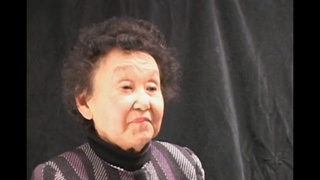Interviews
Her grandfather in a concentration camp in Fusagasuga (Spanish)
(Spanish) When World War II erupted, I imagine, the United States government decided that some citizens needed to be controlled. Germans, Italians, and Japanese in Colombia, heads of households, mainly, were taken to a concentration center in Fusagasugá, in Cundinamarca. They were held there while their families stayed on the land where they lived.
My grandpa had to leave my grandma living on the farm and when that happened, my grandma wrote a letter in Japanese to my grandpa, where she said she had to go... She left out certain things, so he wouldn't worry, so they would let him out to visit them.
Then she wrote letters in Spanish, so the men guarding my grandfather would know. She wrote things like “Little Lily is very sick, we don't know what to do, please try to help us.” Then they let my grandpa out for 15 days to visit my grandma, to make sure the situation went back to normal. Then they sent him back to the concentration camp.
They had some freedoms, but obviously they were under constant police supervision.
Date: September 22, 2019
Location: California, US
Interviewer: Yoko Nishimura
Contributed by: Watase Media Arts Center, Japanese American National Museum








